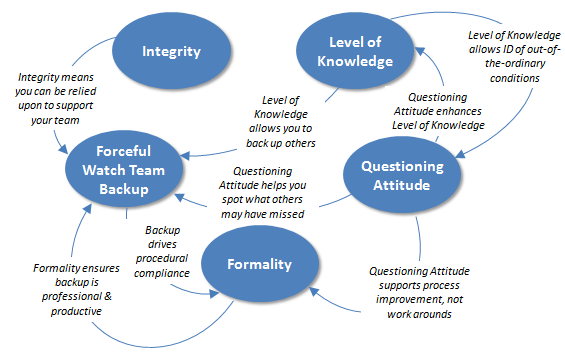The nature of the relationships between the 5 Pillars of Operational Discipline make it necessary for organizations to address all of them if they hope to be successful; the pillars cannot be addressed in isolation and no single pillar is more or less important than the others. For your organization to be in a position where everyone “does the right thing, the right way, every time” it takes a dedicated effort to drive the behaviors outlined in all 5 of the pillars.
Each component of the Operational Discipline definition is supported in some way by all five of the pillars. In order to “do the right thing” employees must know what the right thing is, understand why it is the right thing to do, ensure over time that it is still the right thing, be willing to always do the right thing, ensure others are doing the right thing, etc. And the same follows for “do it the right way” and “do it every time.” It takes employees who have the appropriate Level of Knowledge, behave with Integrity, have a Questioning Attitude, act with Formality and demonstrate Forceful Watch Team Backup to achieve Operational Discipline.
Further driving the need for all five pillars to be addressed together is the manner in which they build off and support one another. If we take a look at Questioning Attitude as an example, we can see how without the other four pillars having a Questioning Attitude would do very little toward advancing the journey toward Operational Discipline. If there is a culture in which employees don’t focus on having the appropriate Level of Knowledge, they won’t have the understanding of the processes and systems around them that would enable them to identify out-of-the-ordinary situations and attempt to surface problems through a Questioning Attitude.
There are two aspects of Integrity that support Questioning Attitude: the Integrity of the “questioner” and the Integrity of those being questioned. The questioner has to be dedicated to always having a Questioning Attitude. While those being questioned need to do what they said they were going to, otherwise others in the organization can’t look at a situation and see things that are unexpected. Forceful Watch Team Backup drives the desire to look out for other employees, and part of that is to have a Questioning Attitude to ensure any potential problems that may be present are identified and resolved. And Formality (procedural compliance & professionalism) drives the right behaviors that make surfacing problems easier because known processes are being followed and everyone is taking their jobs seriously.
A similar exercise can be done with the other pillars to demonstrate how they all support each and the diagram in this post highlights some of the other key relationships between the pillars. If your organization is going to achieve Operational Discipline and ultimately Operational Excellence, the 5 Pillars of Operational Discipline must all be understood and instilled in employees throughout your company to successfully drive the right culture and sustain it over time.

